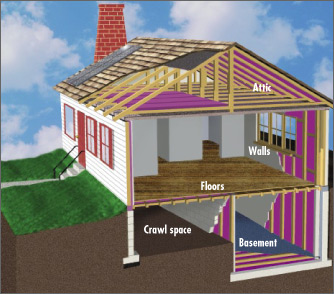Insulation and Sealing Air Leaks
Checking your home's insulation is one of the fastest and most cost-efficient ways to use a wholehouse approach to reduce energy waste and make the most of your energy dollars. A good insulating system includes a combination of products and construction techniques that protect a home from outside temperatures—hot and cold, protect it against air leaks, and control moisture. You can increase the comfort of your home while reducing your heating and cooling needs by up to 10% by investing in proper insulation and sealing air leaks.
Should I Insulate My Home?
The answer is probably "yes" if you:
- Have an older home and haven't added insulation. Only 20% of homes built before 1980 are well insulated.
- Are uncomfortably cold in the winter or hot in the summer—adding insulation creates a more uniform temperature and increases comfort.
- Build a new home, addition, or install new siding or roofing.
- Pay high energy bills.
- Are bothered by noise from outside—insulation muffles sound.

Where to Insulate
Adding insulation in the areas shown above may be the best way to improve your home's energy efficiency.


















